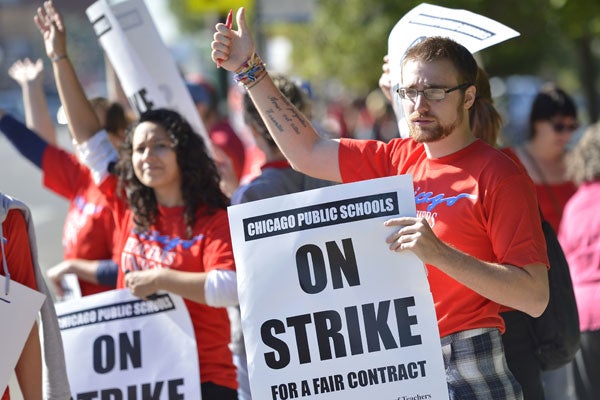Chicago Teachers’ Strike: Unthinkable and Intolerable
James Sherk /
 “Unthinkable and intolerable.” So President Franklin Delano Roosevelt considered strikes by government employees. Karen Lewis, the president of the Chicago Teachers’ Union (CTU), has a different view. She called a strike to block Mayor Rahm Emanuel’s (D) education reforms.
“Unthinkable and intolerable.” So President Franklin Delano Roosevelt considered strikes by government employees. Karen Lewis, the president of the Chicago Teachers’ Union (CTU), has a different view. She called a strike to block Mayor Rahm Emanuel’s (D) education reforms.
Chicago Public Schools have a 40 percent dropout rate. Emanuel considers that unacceptable. He has proposed evaluating teachers on how their students learn. With Chicago’s finances tight, he proposed giving teachers a raise of “only” 8 percent.
Chicago Public School already teachers enjoy the highest average pay of any district in the nation—$76,000 a year, plus benefits. (The CTU argues it is only $71,000 after taking out contributions for their pensions and health care.) The union wanted a 30 percent raise but has indicated it could settle for the 16 percent the city is now offering (raising average annual pay to $88,000).
But the union adamantly opposes the mayor’s education reforms. They want the teacher evaluations watered down. They also want the school district to rehire teachers who lose their jobs in layoffs or school closings—no matter how ineffective they are. Emanuel refused, so the union shut down Chicago’s schools.
The union has a great deal of leverage in its strike. It can prevent more than 350,000 children from receiving an education. It has forced parents to find other ways of caring for their kids while they work. Many children will wander the streets—police are beefing up patrols to forestall trouble.
The union prefers having children pay this price to letting the district fire bad teachers. This is not exactly surprising. Unions serve their members’ interests first. No union would sacrifice its members’ job security to spare parents from a strike.
This is why collective bargaining does not belong in government—and why more states should emulate Governor Scott Walker’s (R–WI) reforms. No competitors exist to pick up the government’s slack. Unlike in the private sector, a government strike shuts down vital services entirely. The government exists to serve the common good, but unions exist to serve themselves. They should not have the power to shut down the government to get their way.
Since their own services have to do with the functioning of the Government, a strike of public employees manifests nothing less than an intent on their part to prevent or obstruct the operations of Government until their demands are satisfied. Such action, looking toward the paralysis of Government by those who have sworn to support it, is unthinkable and intolerable.
